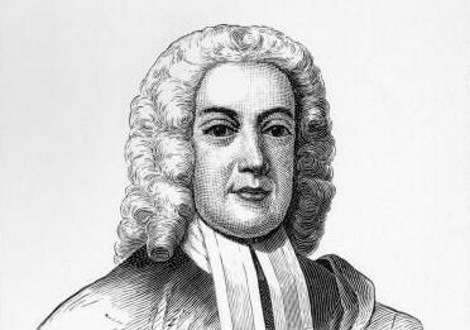[jpshare]Perhaps Thomas Prince can be forgiven for taking eight years to write about the first decade of New England’s history, since he started with Adam, as in Adam and Eve.
He was a Puritan minister in Boston who became infatuated with history at a young age. He is considered a pioneer of historical writing because he relied on original texts and strove for accuracy. He influenced future historians such as Jeremy Belknap and Thomas Hutchinson (who was also governor of Massachusetts Bay).
Thomas Prince was born May 15, 1687 in Sandwich, Mass., the fourth child of Samuel Prince and Mercy Hinkley. He graduated from Harvard in 1707 and then began work on his master’s degree.
Thomas Prince, Historian
When he was in Harvard, he happened to read about the Cottonian Library, a private book collection that formed the foundation of the British Library. It excited in Prince ‘a zeal of laying hold of every book, pamphlet, and paper, both in print and manuscript, which are either written by persons who lived here, or that have any tendency to enlighten our history.’
In 1709 he began two years of travel, to the West Indies and Madeira, then went to England where he preached until 1717. Homesick, he returned to Boston, where he was ordained in 1718. He was appointed pastor of the Old South Meeting House.
During his foreign travels, he wrote that he ‘found the want of a regular history of this country every where complained of,’ and he decided to write it himself.
He began work on A Chronological History of New England, in the Form of Annals in 1728. He didn’t finish the first volume until 1736, which only recorded events to Sept. 7, 1630. His publisher told him the book was getting too big to be published. It did not sell.
Prince soldiered on with a second three-volume set, which went up to 1633. “I have done my utmost, first to find out the truth, and then to relate it in the clearest order,” he wrote. “I have laboured after accuracy, and yet I dare not say that I am without mistake.”
His work contains painstaking detail once it finishes with the history of mankind. He worked hard at pinning down exact dates. For example, on May 16, 1631: “An alarm to all our towns in the night, by a piece shot off; [but where, could not be known] and the Indians having sent us word the day before that the Mohawks are coming down against them and us.”
On July 22, 1631, “The White Angel comes into the bay, (and) lands their twenty-one heifers.”
His history ends in 1633. In the 1740s he got involved with the First Great Awakening, inviting George Whitefield to preach in Boston.
Prince spent his life collecting historical manuscripts, which he stored in the steeple of Old South Meeting House. During the American Revolution, British soldiers scattered the invaluable collection in the streets of Boston before evacuating the city.
The town of Princeton, Mass., was named after him because of his reputation and his ownership of land within the town.
Thomas Prince died on Aug. 22, 1758.
This story was updated in 2017.


4 comments
Regarding Thomas Prince, I recently encountered him as the author of a preface to William Torrey’s
“A brief discourse concerning futurities or things to come,” published in Boston in 1757 (just a year before Prince’s death). Rev. Prince caused Torrey’s manuscript to be published, even though it had been written decades earlier, because of his interest in millennialism. The preface, however, is largely an appreciation of the Rev. Samuel Torrey, William Torrey’s son. The book was “Printed and sold by Edes and Gill, at their printing-office, next to the prison, in Queen-street.”
[…] also wrote this week about Thomas Prince, the historian’s historian. Prince, a minister, was obsessed with New England history and […]
[…] following the 1755 earthquake, Boston Congregational minister Thomas Prince put forward a new theory of earthquakes. Prince had been a strong advocate in 1727 that the quake […]
[…] Thomas Prince, another Boston minister, conjectured the explosions underground did not force the land upward. Rather, he thought, they created pockets of vacuums underground into which the land collapsed. […]
Comments are closed.